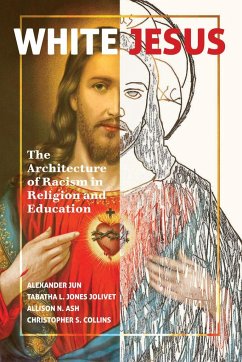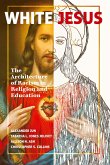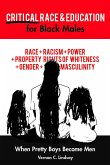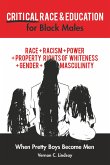In White Jesus: The Architecture of Racism in Religion and Education, White Jesus is conceived as a socially constructed apparatus-a mythology that animates the architecture of salvation-that operates stealthily as a veneer for patriarchal White supremacist, capitalist, and imperialist sociopolitical, cultural, and economic agendas. White Jesus was constructed by combining empire, colorism, racism, education, and religion; the by-product is a distortion that reproduces violence in epistemic and physical ways. The authors distinguish White Jesus from Jesus of the Gospels, the one whose life, death, and resurrection demands sacrificial love as a response-a love ethic. White Jesus is a fraudulent scheme that many devotees of Jesus of Bethlehem naively fell for. This book is about naming the lies, reclaiming the person of Jesus, and reasserting a vision of power that locates Jesus of the Gospels in solidarity with the easily disposed. The catalytic, animating, and life-altering power of the cross of Jesus is enough to subdue White Jesus and his patronage.
White Jesus can be used in a variety of academic disciplines, including education, religion, sociology, and cultural studies. Furthermore, the book will be useful for Christian institutions working to evaluate the images and ideologies of Jesus that shape their biblical ethics, as well as churches in the U.S. that are invested in breaking the mold of homogeneity, civil religion, and uncoupling commitments to patriotism from loyalty to one Kingdom. Educational institutions and religious organizations that are committed to combining justice and diversity efforts with a Jesus ethic will find White Jesus to be a compelling primer.
White Jesus can be used in a variety of academic disciplines, including education, religion, sociology, and cultural studies. Furthermore, the book will be useful for Christian institutions working to evaluate the images and ideologies of Jesus that shape their biblical ethics, as well as churches in the U.S. that are invested in breaking the mold of homogeneity, civil religion, and uncoupling commitments to patriotism from loyalty to one Kingdom. Educational institutions and religious organizations that are committed to combining justice and diversity efforts with a Jesus ethic will find White Jesus to be a compelling primer.
"I loved this book! In this interdisciplinary resource, the authors powerfully show that White Jesus isn't an innocuous inaccuracy. Rather, it is a powerful cornerstone of White supremacy and must be seen for the poison that it is. Drawing connections between historical events, theological affirmations and current, real-world examples of White supremacy in Christianity, this book illuminates the many ways in which White Jesus is the enemy, not the savior, of the world. Every Christian influencer-especially clergy, lay leaders, and scholars-should read this book. I know it'll be required reading in the seminary courses I teach for years to come!" -Christena Cleveland, author of Disunity in Christ:Uncovering the Hidden Forces That Keep Us Apart









